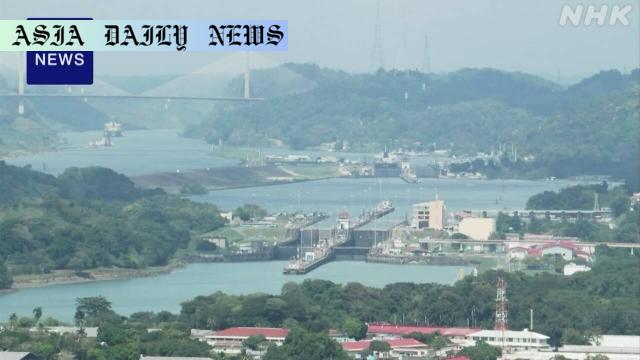Canals: Trump demands free passage for US ships through Panama and Suez, citing US role in their creation and strategic control.
Trump calls for free passage for US ships through key international canals.
Trump links US contributions to Panama and Suez Canal creation as justification.
Proposal ties to broader economic measures against Chinese global dominance.

Trump’s Call for Free Passage Through Key Global Canals
US President Donald Trump recently stirred global discussion with his assertion that American ships, both military and commercial, should navigate the Panama and Suez Canals without charges. In a statement shared on social media, he argued that the United States played an instrumental role in the construction and operation of these canals, and therefore, its vessels deserve exception from toll fees. Emphasizing American sovereignty and global contributions, Trump’s position has sparked both intrigue and debate among policymakers and international trade experts.
The Historical Connection: US Role in Canal Development
The Panama Canal, completed in 1914 under US guidance, transformed maritime routes by connecting the Pacific and Atlantic Oceans. Similarly, the Suez Canal, although initially completed by French engineers in 1869, has had its share of international stakeholders, including the United States. Trump’s statement draws on historical precedent, asserting that these engineering marvels owe their success and operation partially to American intervention and strategy. However, international treaties and governing bodies oversee these canals, complicating unilateral demands for toll-free passage.
Economic and Strategic Ramifications
Trump’s proposal ties to his administration’s broader objective of fortifying American economic dominance amid fierce global competition. His mention of potential retaliatory fees at US ports for Chinese ships underscores this strategy. These measures reflect concerns about China’s increasing influence in critical global infrastructure, including the Panama Canal. Analysts suggest that invoking free passage through these strategic waterways may not only affect global shipping dynamics but could also strain US relations with other nations involved in managing these canals.
Criticism and Feasibility Challenges
While the idea seems ambitious, some critics question its feasibility. The Suez Canal Authority and Panama Canal Administration operate under sovereign agreements and international laws that would make exempting a single nation problematic. Furthermore, such demands might alienate allies and trade partners, potentially offsetting any perceived economic benefits. Maritime experts suggest that unless these proposals are backed by robust diplomatic dialogues, they may face swift rejections or escalate tensions with involved countries.
Implications for Global Trade and US Policy
The Panama and Suez Canals play pivotal roles in global trade, handling significant portions of international cargo. If the US succeeds in pressing for free passage, it could influence shipping costs for American businesses and military logistics positively. However, it may also invite scrutiny over how the US leverages its global influence. Furthermore, these proposals align with Trump’s broader economic measures against China, including potential tariffs and port fees targeting Chinese vessels, reflecting his administration’s strategic focus on revitalizing American industries.
Conclusion: A Bold Move with Uncertain Outcomes
Trump’s assertion underscores his characteristic boldness and strategic push for America-first policies. However, the implications of such a move remain uncertain, as it challenges international maritime practices and diplomatic relations. The call to make US ships exempt from Panama and Suez Canal tolls highlights broader geopolitical tensions and economic competitiveness between global powers. Whether this proposal materializes or fades into rhetoric will depend heavily on the response of international stakeholders and subsequent diplomatic negotiations.



Commentary
A Highly Ambitious Yet Contentious Vision
President Trump’s latest declaration that American ships should navigate the Panama and Suez Canals for free is emblematic of his bold policy approach. The statement highlights his administration’s focus on America-first policies while invoking a historical narrative of US contributions to global infrastructure. Trump’s willingness to address such an issue reflects his commitment to asserting US dominance in international trade, a direction that has characterized much of his presidency.
The Historical Perspective and Diplomatic Challenges
The Panama Canal certainly carries historical significance for the United States, given its role in its construction and operation for much of the 20th century. However, current international treaties and shared governance of these critical waterways present significant diplomatic hurdles. While Trump’s sentiment may resonate with some Americans, addressing such demands in international forums could strain US relations with key global partners. The unilateral nature of his proposal may lead to backlash from nations that view such maneuvers as imperialistic.
Potential Economic Gains Countered by Complex Realities
Economic considerations appear central to Trump’s proposal, tying into broader trade policies aimed at containing China’s growing influence. Free passage in these canals could reduce costs for American businesses and increase competitiveness. However, the broader geopolitical implications, ranging from tensions with canal authorities to the potential alienation of allies, may overshadow any economic advantages. Delicate diplomacy will be crucial to advancing such an agenda successfully.
Final Thoughts
While President Trump’s call for free canal passage is undoubtedly bold, its feasibility remains highly uncertain. The proposition serves as a reminder of the complexities involved in balancing historical narratives with contemporary global politics. It will be interesting to watch how this specific appeal integrates into his administration’s broader foreign and economic strategies moving forward. Regardless of its outcome, it adds another layer to the ongoing debate about America’s role in shaping international commerce and maritime policies.